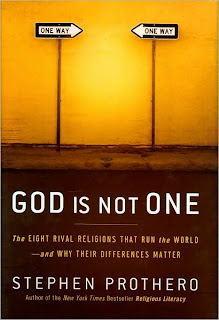God Is Not One: The Eight Rival Religions That Run The World, Stephen Prothero
I'm fascinated by religion, although not from a religious aspect. I'm an atheist. But I read a lot about religion, especially Christian history, because the development of the theories and doctrines is so interesting.
God Is Not One is billed as kind of comparative religion "and Why Their Differences Matter." The author presents it as a response to those who try to conflate all religions into a few simple concepts (do unto others; thou shalt not kill) so as to argue that all religions are essentially the same: different paths up the same mountain.
It was ultimately disappointing. It's little more than a Religion 101 primer on eight religions: Islam, Christianity, Hinduism, Confucianism, Buddhism, Judaism, Daoism, and Yoruba. It was interesting enough, especially since I have very little understanding of Islam, Confucianism, Daoism and Yoruba. For Hinduism, I'd recommend The Hindus: An Alternative History, by Wendy Doniger. I can't speak to the "alternative" aspect, and I understand there is some criticism of how she presents Hinduism, but it seems to be a very good explanation of the basic concept. (And I do recommend reading about Hinduism because it is so different from our Western understanding of religions.)
As for the content of God Is Not One, I, of course, can't quibble with any of the sections, except perhaps, Judaism. I do feel that I have a pretty good understanding of Judaism, it's basic background and how it is practiced -- at least in America. I certainly don't claim any great knowledge of the Torah, Talmud, Kabbalah or that I have done any deep study. However, I thought Prothero's description needed a whole lot more explanation to make it accurate. Yes, I should explain myself, but I don't have time now.
My biggest complaint was the lack of direct comparisons between the religions. This is a book about why the differences in the religions matter, but there are no sections expressly identifying and discussing those differences. Rather, distinctions are identified within the sections on each religion, and often the discussion of the difference is done in a paragraph or just a few sentences. There are 8 sections to the book, one for each of the religions, but nothing further. For example, the book contains statements that Islam doesn't concern itself with sin and Buddhism isn't concerned about salvation. Given Islam's belief in "paradise" and Buddhism's belief that proper thought/living leads to nirvana, I think the book would have benefited greatly from specific discussion of why the goal of "Paradise" in Islam isn't about living a sin-less life; and a better explanation of what Nirvana is and why it differs conceptually from a Christian heaven.
All in all, the book has good information and is worth a read.
Next up: Tom Sawyer. (Yeah, yeah, I should have read that 35 year ago.

No comments :
Post a Comment